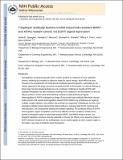Triepitopic Antibody Fusions Inhibit Cetuximab-Resistant BRAF and KRAS Mutant Tumors via EGFR Signal Repression
Author(s)
Manzari, Mandana T.; Rosalia, Elizabeth K.; Chen, Tiffany Fen-yi; Wittrup, Karl Dane; Spangler, Jamie Berta
DownloadWittrup_Triepitopic antibody.pdf (1.193Mb)
OPEN_ACCESS_POLICY
Open Access Policy
Creative Commons Attribution-Noncommercial-Share Alike
Terms of use
Metadata
Show full item recordAbstract
Dysregulation of epidermal growth factor receptor (EGFR) is a hallmark of many epithelial cancers, rendering this receptor an attractive target for cancer therapy. Much effort has been focused on the development of EGFR-directed antibody-based therapeutics, culminating in the clinical approval of the drugs cetuximab and panitumumab. Unfortunately, the clinical efficacy of these drugs has been disappointingly low, and a particular challenge to targeting EGFR with antibody therapeutics has been resistance, resulting from mutations in the downstream raf and ras effector proteins. Recent work demonstrating antibody cocktail-induced synergistic downregulation of EGFR motivated our design of cetuximab-based antibody–fibronectin domain fusion proteins that exploit downregulation-based EGFR inhibition by simultaneously targeting multiple receptor epitopes. We establish that, among our engineered multiepitopic formats, trans-triepitopic antibody fusions demonstrate optimal efficacy, inducing rapid EGFR clustering and internalization and consequently ablating downstream signaling. The combined effects of EGFR downregulation, ligand competition, and immune effector function conspire to inhibit tumor growth in xenograft models of cetuximab-resistant BRAF and KRAS mutant cancers. Our designed triepitopic constructs have the potential to enhance the efficacy and expand the scope of EGFR-directed therapies, and our multiepitopic may be readily applied to other receptor targets to formulate a new class of antibody-based therapeutics.
Date issued
2012-06Department
Massachusetts Institute of Technology. Department of Biological Engineering; Massachusetts Institute of Technology. Department of Biology; Massachusetts Institute of Technology. Department of Chemical Engineering; Koch Institute for Integrative Cancer Research at MITJournal
Journal of Molecular Biology
Publisher
Elsevier
Citation
Spangler, Jamie B., Mandana T. Manzari, Elizabeth K. Rosalia, Tiffany F. Chen, and K. Dane Wittrup. “Triepitopic Antibody Fusions Inhibit Cetuximab-Resistant BRAF and KRAS Mutant Tumors via EGFR Signal Repression.” Journal of Molecular Biology 422, no. 4 (September 2012): 532–544.
Version: Author's final manuscript
ISSN
00222836
1089-8638